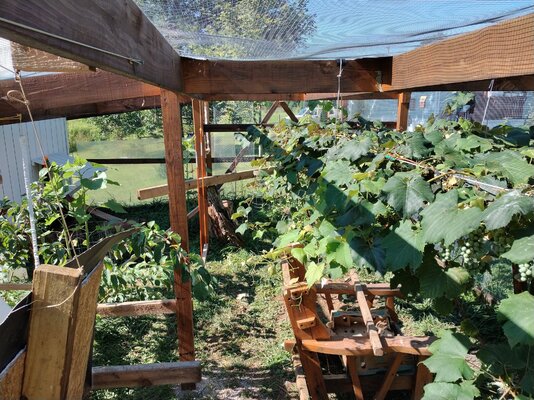Velder
In the Brooder
Seeking solution suggestions and/or options for my situation.
Given:
Me: First time owing chickens, don't really want eggs.
Initially, I wanted 4 to 7 free-range/possibly feral birds to possibly overnight in trees and control ticks.
But since then, I've read the the golden ratio is 1:10 or 12 roos to hens.
I've spent more time with these chicks/chickens than any sane man should.
Currently, I don't want them over-nighting in the trees for fear of owls and other predators.
I don't have a barn and such, or any other coops, so it's not easy for me to separate them, although any temporary housing suggestions are welcome should that be a suggestion.
I have a few acres as yard for free ranging. (plus field and forest)
No children around my residence and I have not had an attack by any of the roos.
5 Roos, 4 hens
Purchased as chicks.
~ 14 weeks old.
Have been free ranging them for over a week now.
Lakenvelder – Flighty, active, often in trees, needs large area, not good with confinement, good free ranging, not real social with people, may be a little problematic with socializing with other birds – depends.
I'm providing the following information for a solution to my situation and because I think it's likely that re-homing some of these birds may also be a solution.
Again, this breed is not know to be particularly social with people and I never tried to hold them (including as chicks) as it was obvious they didn't really like it. A few crawled on me, one roo in particular who was the first to crawl on my hand as a chick and who did it very frequently was (Ferris) as he always wanted to go for a ride - even on his day off. First to greet me, be near me.
=====================================================
Rooster Descriptions: Anecdotal, not really relevant unless I'm trying to re-home them.
At 8 weeks, a small precocious roo (Napoleon) started mounting females very roughly, also grabbed another male by the wing for eating the food that I pointed out to him and not roosting quick enough. He pecked me once and pecked in my direction once or twice since, started to peck at me once but it was understandable because I had was holding another roo that was flipping out, so he was defending the flock, also he may have soon noticed that I wasn't hurting the held roo.
The smaller Napoleon (who "matured" earlier) was the lead male, but now Ferris is and he is the most muscular and probably the biggest bird. I wonder if Ferris has drifted from Lakenvelder as he was more social, has more black in his body (should be white) and appears to be a little squatter than the others, he may be fatter or just more mature – not sure. As the leader, Napoleon was aloof/distant, but has warmed up just a little recently. I've noticed that the aloof leaders don't always take food from my hand as they appear to have a job to do.
Frankie (aka Pecker), anther tall immature Roo who is so relaxed, (particularly when he goes to Hollywood) lets me rub under his wings (when it's hot) or rub his feathers heavily to remove things, particularly in the evening after I've given them a treat and they've somewhat settled down for pre-roost.
Peck, another smaller Roo who pecked or groomed me a lot, first to peck me as a chick. I have since read that one shouldn't allow pecking, and I could be incorrect, but it usually seems like affectionate grooming. This one also used to jump or crawl on me quite frequently.
Peter, another smaller Roo who is somewhat aloof.
Ferris (dominant roo) always favorite bird recently chased Frankie (relaxed tallest roo) until exhaustion (I suspect, ~ 100 ft run) until he stopped whereby Ferris pinned or mounted him on his back and attacked his neck, I swatted him off and he still tried to come back to him. I thought he might kill him, or that the bird was paralyzed, but he was just submitting.
Note: hard to find results while Googling anything regarding a roo pinning or mounting another roo.
Ferris was a little more aloof or distant for a day or two, but seems to be a little friendlier now. But again, he recently became the leader and they seem to be a little more aloof – plus aging and hormones.
Last evening, Ferris was chasing Napoleon around the run (not just for fun), Napoleon is small but an agile and athletic masculine bird and my run is big with many perches, stumps, etc. Shortly thereafter Ferris roughly mounted a hen and Napoleon grabbed him by the neck, Napoleon scampered away with his agility. These problems with the males are escalating.
=======================================================
Run: 16' X 24' x 6.5' tall hardware cloth encloses (plus 8x8 under coop) = 448 sq. ft.
Includes a 16ft. three strand grape-vine on trellis (2 wires @ 5.5' ht. and 1 @ 3' ht.), 1 red-twig dogwood shrub, and a half of and A-frame lean-to, with roof for wind-break, and cover, many perches, and stumps, a few sunflowers, cucumbers, etc. First year will be better next year.
I do get what I originally wanted, the birds in the trees from about 8 ft. to 20 ft up in the trees and they want to roost there overnight; I was tossing 8' sections of plastic drip-edge in their direction to get them out.
My issue - The situation with the roos in increasing everyday, the hens are stressed, when they free-range, they stay in a 30' tall arborvitae for cover of heat, potential predators, and I suspect the 'affection' of the roos. They seem a little stressed in the evening pre-roost when I give them some treats due to the currently infrequent but increasing chasing, fighting, submitting, etc.
For all of the negatives regarding this breed and their actions, again, no attacks, all feed out of my hand, some not as frequently, Ferris still often follows me, particularly when I pull weeds, real close to me. I feel very comfortable laying on the ground with all of the birds around me. One note, Frankie has pecked, or pecked at my eye twice; I know it was not hostile in any manner, moreso stupidity. Related, Ferris pecked my eye at about three (3) weeks, but I do not think their brains had registered me as an entity or that it was my eye at the time; and shortly after you could watch them twisting their heads while staring at you and you could hear the light-bulbs clicking on as they realized that you were a different creature than they were – and not a fellow dinosaur, anyway, I digress.
Some of the birds come near me after being feed in the evening as a sign that they actually like me. Several of the birds will use my arms to relocate. I can see Ferris look somewhere in the run knowing that he wants to go there, and I can either use my arm(s) for him to walk on to relocate, most of the birds will do this, and with Ferris I can use one hand to or elbow to transport him say 6 to 10' away. Some of the birds do this too. So, I suspect they are mostly OK birds, but they're just not programmed to have 5 roos and 4 hens, and while 5 roos without hens may work, I'd suspect that the stress may be a little higher than 1 roo and the 'perfect' number of hens.
They were are cute with no worries until they started to mature more, hormones, etc. The hens are still cute and affectionate, like being near me after being fed pre-roosting time; Frankie does too, but I suspect, and although he is the tallest, he is one of the most immature birds, the others being Peter and Peck.
Recall, I'm new with chickens, so I'm seeking options, suggestions, advice. I suspect my options are:
1 – Get rid of all of them – OK. And how.
2 – (Given golden ratio of 10 – 12 hens per roo) get 56 more hens so that each roos has 12 hens. Not gonna happen.
3 – Keep all four (4) hens and get rid of the roos.
This is a viable option, but not of my druthers as I don't really want many or any eggs and I do want them to free-range and I think at least one male would be better for free ranging. Plus, I like seeing the males free ranging in the yard and the males (particularly with the hens hiding in the arborvitae) roam around more than the hens. Is this generally true?
4 – Keep all five (5) roos and get rid of the hens.
This may be a viable option, but particularly considering this breeds characteristics I'd suspect that the stress would be little higher than 1 roo, and the perfect number of hens. I'm assuming that the hens are the majority of the problem, please comment on this as I'm not positive that this is true, i.e. I haven't seen this frequent enough in the forums to be certain of this myself. And it may not be viable because this is not guaranteed to work. However, they were raised together, they do have a large coop, 48 sq. ft., large run with many perches, stumps, etc. Plus, the hens are nice.
5 – Keep one roo and add 6 or 8 more hens for a total of 10 – 12 hens.
More birds than I originally wanted.
Should I keep 10 – 12 hens? What are the disadvantages of keeping only 4 hens or 6 hens.
I don't really want 11to 3 birds, I'd rather have 4 to 7 but I also don't want the hens stressed so I will go more if necessary – any suggestions.
What about bring in an older hen or two to teach the roos some mating manners, possibly manners in general?
Sophie's choice:
Keep Ferris, my favorite roo from the beginning, seems to be a good leader.
Keep relaxed Frankie (aka Pecker), a recent maybe favorite roo, may be too relaxed to be a good leader/protector, but I suspect since he's probably the tallest bird and one of the least mature, is likely to mature late, which may make him a better leader but he may decide to leave Hollywood and become less relaxed and a little meaner.
I probably wouldn't keep Peck, a smaller inquisitive roo, who loves to peck and jump on you but doesn't like to be petted, but he may mature well – but he an interesting bird.
I probably wouldn't keep Peter, a smaller somewhat aloof roo, but he may mature well.
Napoleon is an oddball, or maybe what a Lakenvelder should be, smaller, matured quicker, is aloof, was mean when mating (I've read that young roos will mate roughly), but I suspect this guy would be a great protector of the flock with the only limitation being his size, but I'd suspect he'd make up for it with determination and agility. This bird has good physical confirmation and is marked/colored as a Lakenvelder shoud be – white body, black head/neck and tail.
6 – Combination – to do #4 first and then #5 separate the hens from the roos and see if the bachelor pad works.
Try the bachelor pad, at what age will I know that it does work, as I may know sooner that it doesn't work.
How far removed would the hens have to be for the roos to consider the hens insignificant?
Relocated completely, out of sight, sound, 500' 100'?
How long would it take for the roos to consider the hens gone?
Also, the free ranging roos would discover the hens, would this make the hens significant again?
Any suggestions on housing and runs for the hens?
I'd hate to send them to a tiny coop/run, while the roos live in luxury and free-range.
Would letting either the hens or roos free-range (altering days) and getting near the other sex cause problems?
Note: the birds seem anxious when separated, at least the roos do, e.g. bird free ranging outside of the run while they are 'lost' in the run. They're slowly figuring out that the run door is the pathway to free ranging.
7- Edit: I could keep the pullets (get rid of the cockerels), then next spring get another cockerel and introduce him when the pullets have aged into hens. Maybe also get a few more pullet chicks - but I like three (3) of the cockerels.
I'd appreciate options and suggestions re. what to keep, what to use if separating them for some time, how long to separate to know, any options or things that I am overlooking or not aware of as a new owner of chickens. Will removing – and what constitutes removing – the hens eliminate or resolve most of my problems between the roos, etc.
I took pictures just for this post, so no great shots.
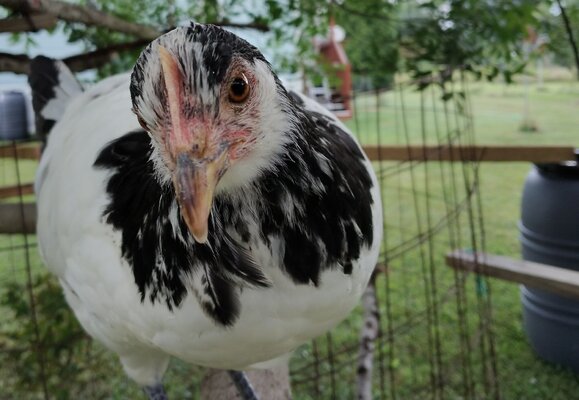
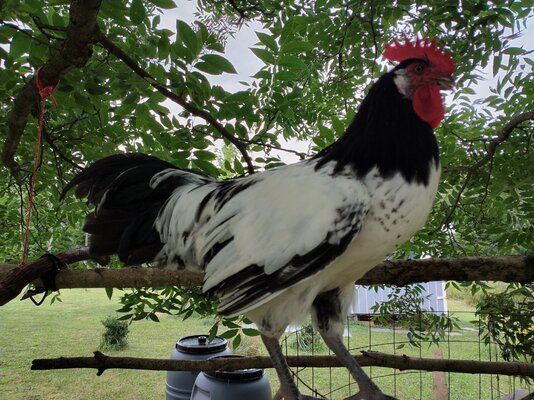
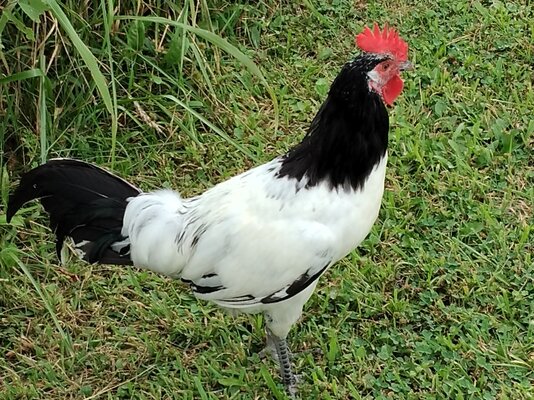
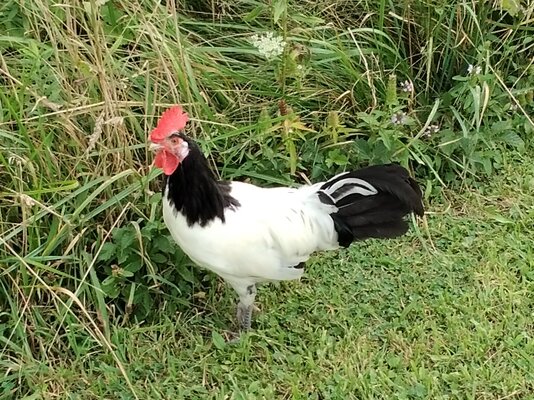
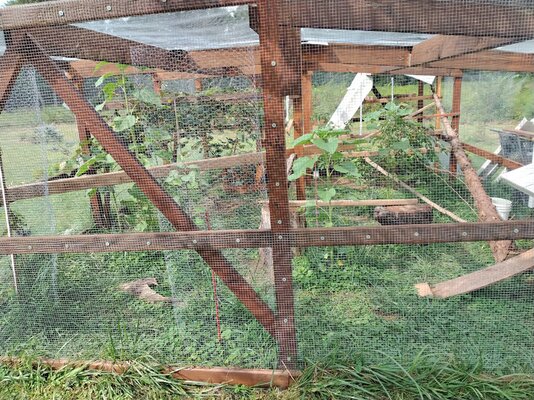
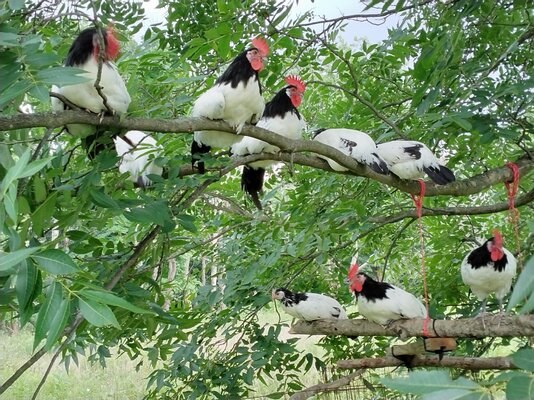
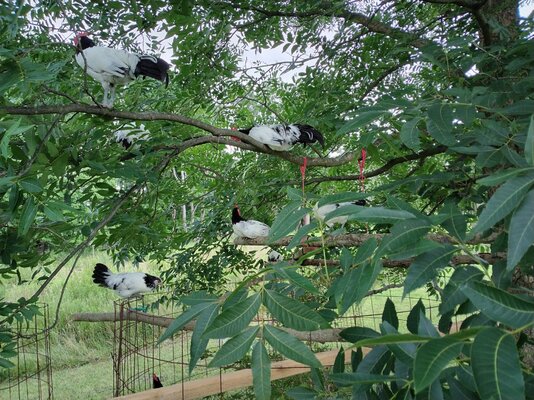
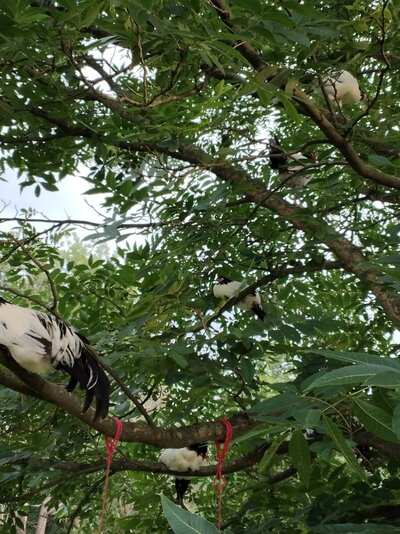
Thank You
Given:
Me: First time owing chickens, don't really want eggs.
Initially, I wanted 4 to 7 free-range/possibly feral birds to possibly overnight in trees and control ticks.
But since then, I've read the the golden ratio is 1:10 or 12 roos to hens.
I've spent more time with these chicks/chickens than any sane man should.
Currently, I don't want them over-nighting in the trees for fear of owls and other predators.
I don't have a barn and such, or any other coops, so it's not easy for me to separate them, although any temporary housing suggestions are welcome should that be a suggestion.
I have a few acres as yard for free ranging. (plus field and forest)
No children around my residence and I have not had an attack by any of the roos.
5 Roos, 4 hens
Purchased as chicks.
~ 14 weeks old.
Have been free ranging them for over a week now.
Lakenvelder – Flighty, active, often in trees, needs large area, not good with confinement, good free ranging, not real social with people, may be a little problematic with socializing with other birds – depends.
I'm providing the following information for a solution to my situation and because I think it's likely that re-homing some of these birds may also be a solution.
Again, this breed is not know to be particularly social with people and I never tried to hold them (including as chicks) as it was obvious they didn't really like it. A few crawled on me, one roo in particular who was the first to crawl on my hand as a chick and who did it very frequently was (Ferris) as he always wanted to go for a ride - even on his day off. First to greet me, be near me.
=====================================================
Rooster Descriptions: Anecdotal, not really relevant unless I'm trying to re-home them.
At 8 weeks, a small precocious roo (Napoleon) started mounting females very roughly, also grabbed another male by the wing for eating the food that I pointed out to him and not roosting quick enough. He pecked me once and pecked in my direction once or twice since, started to peck at me once but it was understandable because I had was holding another roo that was flipping out, so he was defending the flock, also he may have soon noticed that I wasn't hurting the held roo.
The smaller Napoleon (who "matured" earlier) was the lead male, but now Ferris is and he is the most muscular and probably the biggest bird. I wonder if Ferris has drifted from Lakenvelder as he was more social, has more black in his body (should be white) and appears to be a little squatter than the others, he may be fatter or just more mature – not sure. As the leader, Napoleon was aloof/distant, but has warmed up just a little recently. I've noticed that the aloof leaders don't always take food from my hand as they appear to have a job to do.
Frankie (aka Pecker), anther tall immature Roo who is so relaxed, (particularly when he goes to Hollywood) lets me rub under his wings (when it's hot) or rub his feathers heavily to remove things, particularly in the evening after I've given them a treat and they've somewhat settled down for pre-roost.
Peck, another smaller Roo who pecked or groomed me a lot, first to peck me as a chick. I have since read that one shouldn't allow pecking, and I could be incorrect, but it usually seems like affectionate grooming. This one also used to jump or crawl on me quite frequently.
Peter, another smaller Roo who is somewhat aloof.
Ferris (dominant roo) always favorite bird recently chased Frankie (relaxed tallest roo) until exhaustion (I suspect, ~ 100 ft run) until he stopped whereby Ferris pinned or mounted him on his back and attacked his neck, I swatted him off and he still tried to come back to him. I thought he might kill him, or that the bird was paralyzed, but he was just submitting.
Note: hard to find results while Googling anything regarding a roo pinning or mounting another roo.
Ferris was a little more aloof or distant for a day or two, but seems to be a little friendlier now. But again, he recently became the leader and they seem to be a little more aloof – plus aging and hormones.
Last evening, Ferris was chasing Napoleon around the run (not just for fun), Napoleon is small but an agile and athletic masculine bird and my run is big with many perches, stumps, etc. Shortly thereafter Ferris roughly mounted a hen and Napoleon grabbed him by the neck, Napoleon scampered away with his agility. These problems with the males are escalating.
=======================================================
Run: 16' X 24' x 6.5' tall hardware cloth encloses (plus 8x8 under coop) = 448 sq. ft.
Includes a 16ft. three strand grape-vine on trellis (2 wires @ 5.5' ht. and 1 @ 3' ht.), 1 red-twig dogwood shrub, and a half of and A-frame lean-to, with roof for wind-break, and cover, many perches, and stumps, a few sunflowers, cucumbers, etc. First year will be better next year.
I do get what I originally wanted, the birds in the trees from about 8 ft. to 20 ft up in the trees and they want to roost there overnight; I was tossing 8' sections of plastic drip-edge in their direction to get them out.
My issue - The situation with the roos in increasing everyday, the hens are stressed, when they free-range, they stay in a 30' tall arborvitae for cover of heat, potential predators, and I suspect the 'affection' of the roos. They seem a little stressed in the evening pre-roost when I give them some treats due to the currently infrequent but increasing chasing, fighting, submitting, etc.
For all of the negatives regarding this breed and their actions, again, no attacks, all feed out of my hand, some not as frequently, Ferris still often follows me, particularly when I pull weeds, real close to me. I feel very comfortable laying on the ground with all of the birds around me. One note, Frankie has pecked, or pecked at my eye twice; I know it was not hostile in any manner, moreso stupidity. Related, Ferris pecked my eye at about three (3) weeks, but I do not think their brains had registered me as an entity or that it was my eye at the time; and shortly after you could watch them twisting their heads while staring at you and you could hear the light-bulbs clicking on as they realized that you were a different creature than they were – and not a fellow dinosaur, anyway, I digress.
Some of the birds come near me after being feed in the evening as a sign that they actually like me. Several of the birds will use my arms to relocate. I can see Ferris look somewhere in the run knowing that he wants to go there, and I can either use my arm(s) for him to walk on to relocate, most of the birds will do this, and with Ferris I can use one hand to or elbow to transport him say 6 to 10' away. Some of the birds do this too. So, I suspect they are mostly OK birds, but they're just not programmed to have 5 roos and 4 hens, and while 5 roos without hens may work, I'd suspect that the stress may be a little higher than 1 roo and the 'perfect' number of hens.
They were are cute with no worries until they started to mature more, hormones, etc. The hens are still cute and affectionate, like being near me after being fed pre-roosting time; Frankie does too, but I suspect, and although he is the tallest, he is one of the most immature birds, the others being Peter and Peck.
Recall, I'm new with chickens, so I'm seeking options, suggestions, advice. I suspect my options are:
1 – Get rid of all of them – OK. And how.
2 – (Given golden ratio of 10 – 12 hens per roo) get 56 more hens so that each roos has 12 hens. Not gonna happen.
3 – Keep all four (4) hens and get rid of the roos.
This is a viable option, but not of my druthers as I don't really want many or any eggs and I do want them to free-range and I think at least one male would be better for free ranging. Plus, I like seeing the males free ranging in the yard and the males (particularly with the hens hiding in the arborvitae) roam around more than the hens. Is this generally true?
4 – Keep all five (5) roos and get rid of the hens.
This may be a viable option, but particularly considering this breeds characteristics I'd suspect that the stress would be little higher than 1 roo, and the perfect number of hens. I'm assuming that the hens are the majority of the problem, please comment on this as I'm not positive that this is true, i.e. I haven't seen this frequent enough in the forums to be certain of this myself. And it may not be viable because this is not guaranteed to work. However, they were raised together, they do have a large coop, 48 sq. ft., large run with many perches, stumps, etc. Plus, the hens are nice.
5 – Keep one roo and add 6 or 8 more hens for a total of 10 – 12 hens.
More birds than I originally wanted.
Should I keep 10 – 12 hens? What are the disadvantages of keeping only 4 hens or 6 hens.
I don't really want 11to 3 birds, I'd rather have 4 to 7 but I also don't want the hens stressed so I will go more if necessary – any suggestions.
What about bring in an older hen or two to teach the roos some mating manners, possibly manners in general?
Sophie's choice:
Keep Ferris, my favorite roo from the beginning, seems to be a good leader.
Keep relaxed Frankie (aka Pecker), a recent maybe favorite roo, may be too relaxed to be a good leader/protector, but I suspect since he's probably the tallest bird and one of the least mature, is likely to mature late, which may make him a better leader but he may decide to leave Hollywood and become less relaxed and a little meaner.
I probably wouldn't keep Peck, a smaller inquisitive roo, who loves to peck and jump on you but doesn't like to be petted, but he may mature well – but he an interesting bird.
I probably wouldn't keep Peter, a smaller somewhat aloof roo, but he may mature well.
Napoleon is an oddball, or maybe what a Lakenvelder should be, smaller, matured quicker, is aloof, was mean when mating (I've read that young roos will mate roughly), but I suspect this guy would be a great protector of the flock with the only limitation being his size, but I'd suspect he'd make up for it with determination and agility. This bird has good physical confirmation and is marked/colored as a Lakenvelder shoud be – white body, black head/neck and tail.
6 – Combination – to do #4 first and then #5 separate the hens from the roos and see if the bachelor pad works.
Try the bachelor pad, at what age will I know that it does work, as I may know sooner that it doesn't work.
How far removed would the hens have to be for the roos to consider the hens insignificant?
Relocated completely, out of sight, sound, 500' 100'?
How long would it take for the roos to consider the hens gone?
Also, the free ranging roos would discover the hens, would this make the hens significant again?
Any suggestions on housing and runs for the hens?
I'd hate to send them to a tiny coop/run, while the roos live in luxury and free-range.
Would letting either the hens or roos free-range (altering days) and getting near the other sex cause problems?
Note: the birds seem anxious when separated, at least the roos do, e.g. bird free ranging outside of the run while they are 'lost' in the run. They're slowly figuring out that the run door is the pathway to free ranging.
7- Edit: I could keep the pullets (get rid of the cockerels), then next spring get another cockerel and introduce him when the pullets have aged into hens. Maybe also get a few more pullet chicks - but I like three (3) of the cockerels.
I'd appreciate options and suggestions re. what to keep, what to use if separating them for some time, how long to separate to know, any options or things that I am overlooking or not aware of as a new owner of chickens. Will removing – and what constitutes removing – the hens eliminate or resolve most of my problems between the roos, etc.
I took pictures just for this post, so no great shots.








Thank You
Last edited:




 Yes, I suspect this will be much more difficult.
Yes, I suspect this will be much more difficult.

